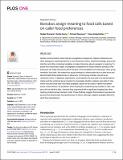Files in this item
Bonobos assign meaning to food calls based on caller food preferences
Item metadata
| dc.contributor.author | Shorland, Gladez | |
| dc.contributor.author | Genty, Emilie | |
| dc.contributor.author | Neumann, Christof | |
| dc.contributor.author | Zuberbühler, Klaus | |
| dc.date.accessioned | 2022-06-20T09:30:02Z | |
| dc.date.available | 2022-06-20T09:30:02Z | |
| dc.date.issued | 2022-06-15 | |
| dc.identifier | 280148166 | |
| dc.identifier | bf2e502d-65ed-4b76-8af2-c62a21108f90 | |
| dc.identifier | 85132150545 | |
| dc.identifier | 000843619700083 | |
| dc.identifier.citation | Shorland , G , Genty , E , Neumann , C & Zuberbühler , K 2022 , ' Bonobos assign meaning to food calls based on caller food preferences ' , PLoS ONE , vol. 17 , no. 6 , e0267574 . https://doi.org/10.1371/journal.pone.0267574 | en |
| dc.identifier.issn | 1932-6203 | |
| dc.identifier.other | Jisc: 392219 | |
| dc.identifier.other | publisher-id: pone-d-21-31131 | |
| dc.identifier.other | ORCID: /0000-0001-8378-088X/work/114641175 | |
| dc.identifier.uri | https://hdl.handle.net/10023/25548 | |
| dc.description | Funding: The study was funded by an ERC starting grant PRILANG 283871 to KZ (https://erc.europa.eu/funding/starting-grants) and by the Swiss National Science Foundation (NCCR Evolving Language, grant agreement 51NF40_180888. | en |
| dc.description.abstract | Human communication relies heavily on pragmatic competence. Speech utterances are often ambiguous requiring listeners to use interaction history, shared knowledge, presumed intention and other contextual variables to make inferences about a speaker’s meaning. To probe the evolutionary origins of pragmatic competence we tested whether bonobos (Pan paniscus) can make inferences about the type of food available from listening to other group members’ food calls. We trained two group members to either prefer blue or pink chow and demonstrated these preferences to observers. A third group member served as an untrained control. In playback experiments, we broadcast the food calls of a trained demonstrator and the untrained group member to investigate whether subjects were able to infer which coloured chow was most likely available, based on the callers’ trained food preferences or lack thereof. As predicted, when hearing the untrained group member’s calls, subjects did not exhibit a bias, whereas they responded with a significant foraging bias when hearing a trained group member’s calls. These findings suggest that bonobos may take into account the idiosyncratic food preferences of others, although subjects probably differed in what they remembered. | |
| dc.format.extent | 19 | |
| dc.format.extent | 1003634 | |
| dc.language.iso | eng | |
| dc.relation.ispartof | PLoS ONE | en |
| dc.subject | BF Psychology | en |
| dc.subject | NDAS | en |
| dc.subject.lcc | BF | en |
| dc.title | Bonobos assign meaning to food calls based on caller food preferences | en |
| dc.type | Journal article | en |
| dc.contributor.institution | University of St Andrews. Institute of Behavioural and Neural Sciences | en |
| dc.contributor.institution | University of St Andrews. Centre for Social Learning & Cognitive Evolution | en |
| dc.contributor.institution | University of St Andrews. School of Psychology and Neuroscience | en |
| dc.identifier.doi | https://doi.org/10.1371/journal.pone.0267574 | |
| dc.description.status | Peer reviewed | en |
This item appears in the following Collection(s)
Items in the St Andrews Research Repository are protected by copyright, with all rights reserved, unless otherwise indicated.

